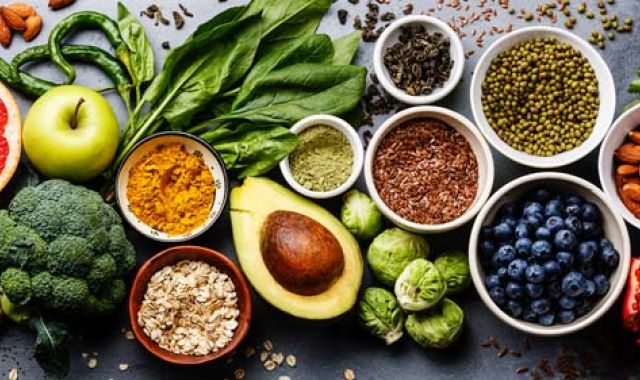Your Diet
Every few months a different diet with a popular catch phase arrives and catches your attention. Unfortunately, once the hype has faded, so does your diet. It's important to find a diet that works for you, a diet with consistency. Below are a list of my favorite diets for clients, patients friends and family. Take your time, read the descriptions and click on the blue links for recipes. My passion is to help individuals live a healthy lifestyle that fits their needs and finding the diet that works for you is the first step. If you have any questions, you may contact me directly.
The Vegan/Plant-Base Diet
Healthy eating may be best achieved with a plant-based diet, which we define as a regimen that encourages whole, plant-based foods and discourages meats, dairy products, and eggs as well as all refined and processed foods.
We present a case study as an example of the potential health benefits of such a diet. Research shows that plant-based diets are cost-effective, low-risk interventions that may lower body mass index, blood pressure, HbA1C, and cholesterol levels. They may also reduce the number of medications needed to treat chronic diseases and lower ischemic heart disease mortality rates.
Physicians should consider recommending a plant-based diet to all their patients, especially those with high blood pressure, diabetes, cardiovascular disease, or obesity. Source (The US National Library of Medicine/National Institute of Health (PMCID: PMC3662288)
The Vegetarian Diet
Recent studies of the long-term health effects of meat-free, plant-based diets have provided further evidence of their benefits. A study published in December 2013 in the Journal of the Academy of Nutrition and Dietetics found that vegetarians have the lowest average body mass index (BMI) and meat eaters have the highest BMIs.
People with BMIs above 30 are obese, and obesity is associated with a higher risk for type 2 diabetes, high blood pressure, metabolic syndrome, diverticulitis, heart disease, and other illnesses. A study published in the March 9, 2015, issue of JAMA Internal Medicine suggests that a meat-free diet can reduce the risk of developing colon cancer.
Personal Note
LaTrish's diet has been Vegan/Planet-base for over a decade. Currently my diet is 80% plant-base & 20% pescatarian. I began my plant-base journey in 2008. Before 2008 I ate fairly healthy no red meat, no pork, chicken, turkey and fish were my main sources of protein. However since eating plant-base personally it has been the perfect match. I only eat fresh and mostly organic. I cook all of my meals, I don't eat processed foods, can foods, packaged foods of any kind. My motto is if I can't pick it from a garden or a tree, I don't eat it:-) Regardless of my diet choice, my goal is to encourage and help people find the diet that works for them consistently.
The Pescatarian Diet
Like a Mediterranean eating pattern, a healthful pescatarian diet is loaded with fruits and vegetables, whole grains, nuts, and legumes. "Following a pescatarian diet could potentially lower your risk of heart disease, type 2 diabetes, dementia, erectile dysfunction and depression."
A 2007 article in the American Heart Association journal reported that eating fish just once or twice a week was associated with a 42- to 50-percent reduction in the risk of sudden cardiac death in healthy adults.
In two other studies, subjects who ate vegetarian diets, including pescatarian diets, had lower BMIs and a substantially lower risk of type 2 diabetes and death during a six-year study period than those who regularly ate meat and poultry.
The Mediterranean Diet
The Mediterranean diet is a primarily plant-based eating plan that includes daily intake of whole grains, olive oil, fruits, vegetables, beans and other legumes, nuts, herbs, and spices. Other foods like animal proteins are eaten in smaller quantities, with the preferred animal protein being fish and seafood. Although the pyramid shape suggests the proportion of foods to eat (e.g., eat more fruits and vegetables and less dairy foods), it does not specify portion sizes or specific amounts. It is up to the individual to decide exactly how much food to eat at each meal, as this will vary by physical activity and body size.
There are additional points that make this eating plan unique:The PREDIMED study, a primary prevention trial including thousands of people with diabetes or other risk factors for heart disease found that a Mediterranean diet supplemented with extra virgin olive oil or nuts and without any fat and calorie restrictions reduced the rates of death from stroke by 30%.
The Dash Diet
The NHLBI-funded studies tested the health benefits of the DASH diet by comparing the DASH diet with the typical American diet or by comparing different variations of the DASH diet. Another NHLBI-funded study, the PREMIER clinical trial, measured the health benefits of following the DASH diet and increasing physical activity. The results of these studies showed that the DASH diet lowers blood pressure and LDL cholesterol in the blood and shaped the NHLBI’s DASH eating plan recommendations, which includes following a DASH diet with reduced sodium intake.
The DASH diet is especially recommended for people with hypertension (high blood pressure) or pre-hypertension. The DASH diet eating plan has been proven to lower blood pressure in studies sponsored by the National Institutes of Health (Dietary Approaches to Stop Hypertension). In addition to being a low salt (or low sodium) plan, the DASH diet provides additional benefits to reduce blood pressure. It is based on an eating plan rich in fruits and vegetables, and low-fat or non-fat dairy, with whole grains. It is a high fiber, low to moderate fat diet, rich in potassium, calcium, and magnesium. The Dash Diet has been medically proven to improve the following: high blood pressure, high blood sugar & high cholesterol.




